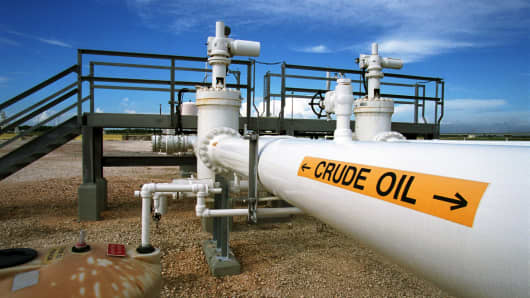"We don't need [the SPR] anymore," said Verleger, a former Council of Economic Advisers economist under President Gerald Ford. He estimates the U.S. could earn revenue somewhere north of $65 billion if it sold all of its strategic stocks. "Imports are going down, and we don't need it anymore."
To be certain, eliminating the SPR—a linchpin of U.S.energy policy for decades and what the Department of Energy calls "a key tool of foreign policy"—is not a decision to be taken lightly. Many analysts argue that there's a need for the U.S. to maintain a buffer against a turbulent geopolitical environment that can't be predicted.
Moreover, critics of the idea say, in the grand scheme of a projected 2013 U.S. budget deficit of $845 billion, the proceeds of a potential SPR sale would scarcely put a dent in the money Washington needs.
"It's a very remote possibility," said Christian O'Neill, an energy analyst at Bloomberg Industries. "There's roughly just under 700 million barrels of oil in the SPR. From that perspective, how much are you really going to make a dent in things in terms of the overall security it provides?" he asked.
An additional factor against liquidating the SPR is the current price of oil. With Brent crude and West Texas Intermediate sharply below their former highs of more than $100, it means that at least part of the US oil stocks would be sold at a loss. O'Neill points out that selling into a weak oil market could ultimately cost taxpayers in the long run.
Verleger argues that countries like Canada do not maintain a strategic oil stockpile, yet O'Neill says that comparison is less than accurate.
"The Canadian government is long crude oil production relative to demand, unlike the U.S., [which] consumes more than it produces," O'Neill said. "If the U.S. were balanced, then you can make that case, but that is not the case today."
Still, two key developments give some credence to how the world's largest economy might be able to do without a large store of oil.
Underscoring how the U.S. is now producing fossil fuels hand over virtual fist, oil markets were convulsed by Energy Information Administration data this week that showed U.S. crude stocks rising to their highest level on record at 395.28 million barrels.
Meanwhile, the U.S. trade deficit contracted in February, driven in large part by oil imports tumbling to their weakest level in nearly two decades.
(Read More: US Energy Boom Seen Alleviating Age-Old Trade Imbalance)
The U.S. has "built stocks of things like helium, metal, copper," said Verleger, adding that "when you need them you build them, and when you don't need them you get rid of them."
—By CNBC's Javier David





